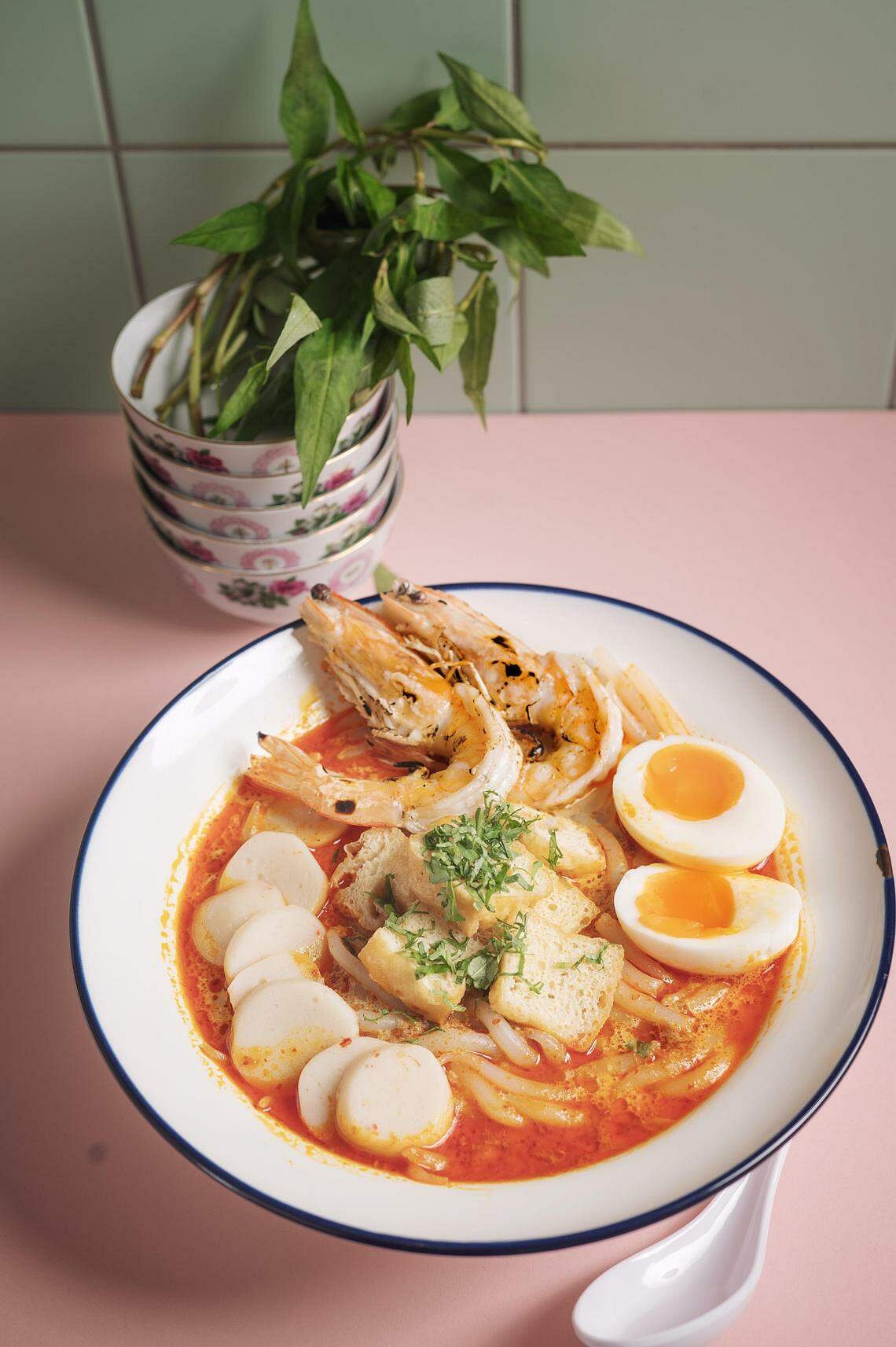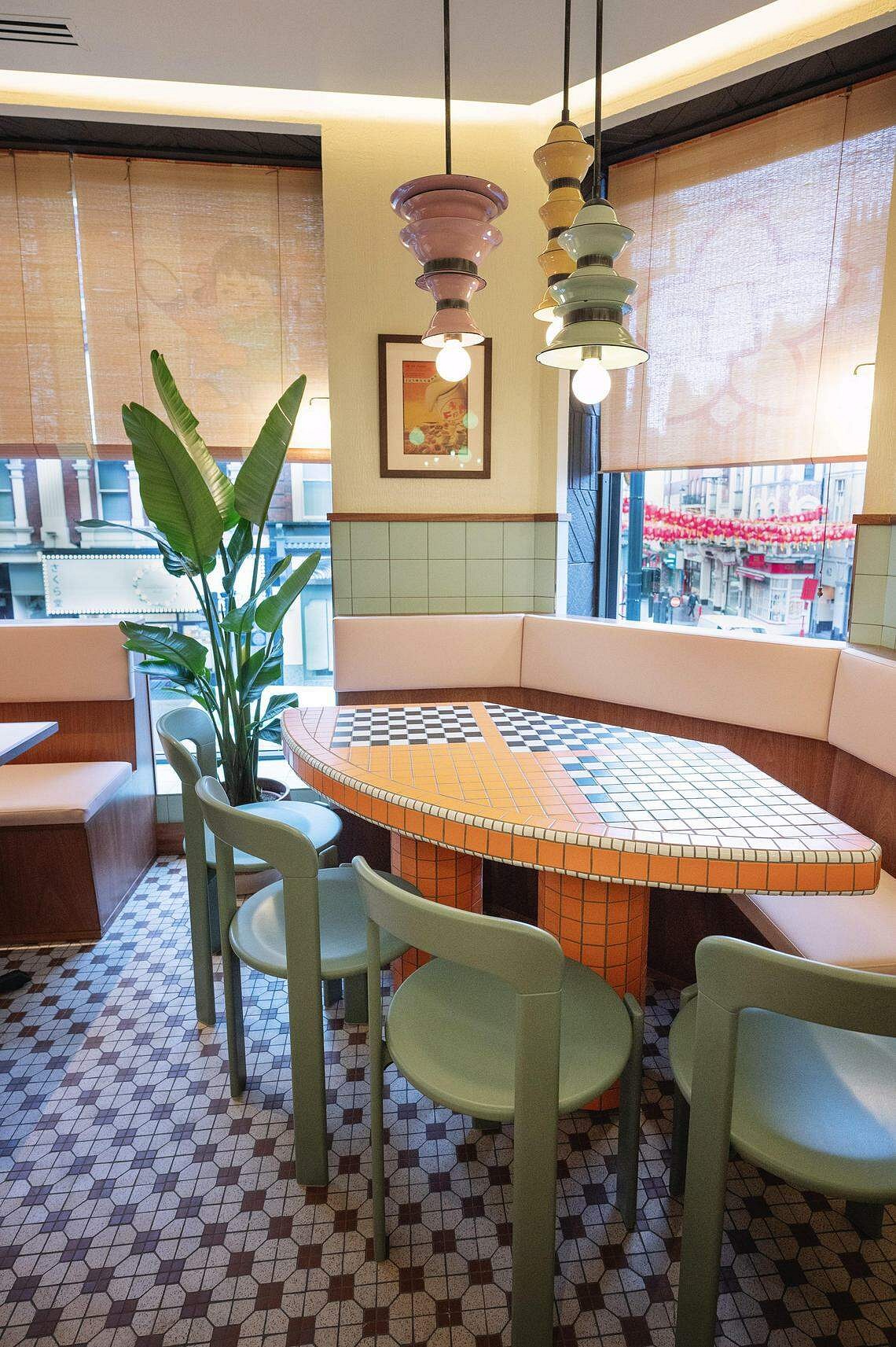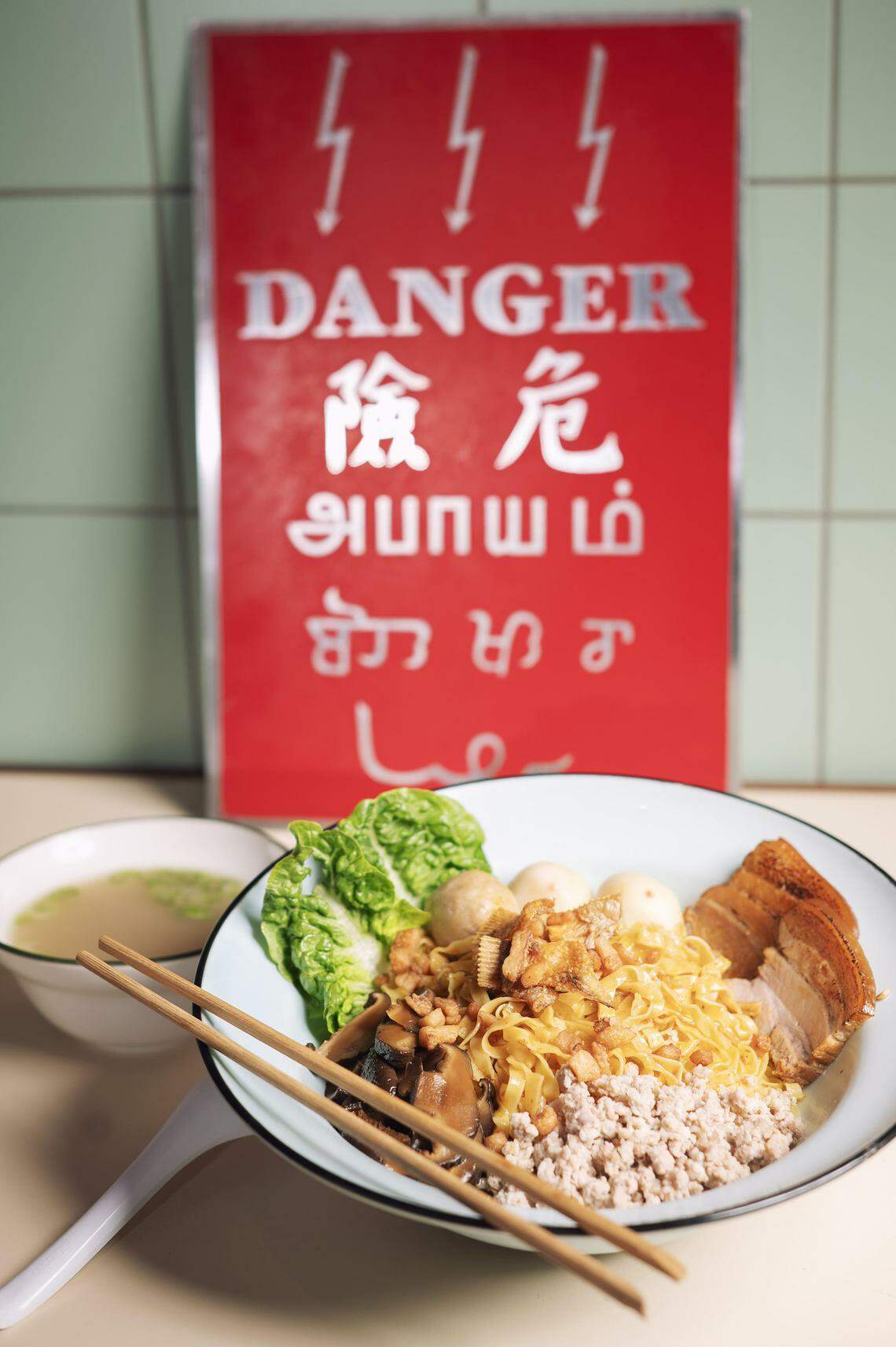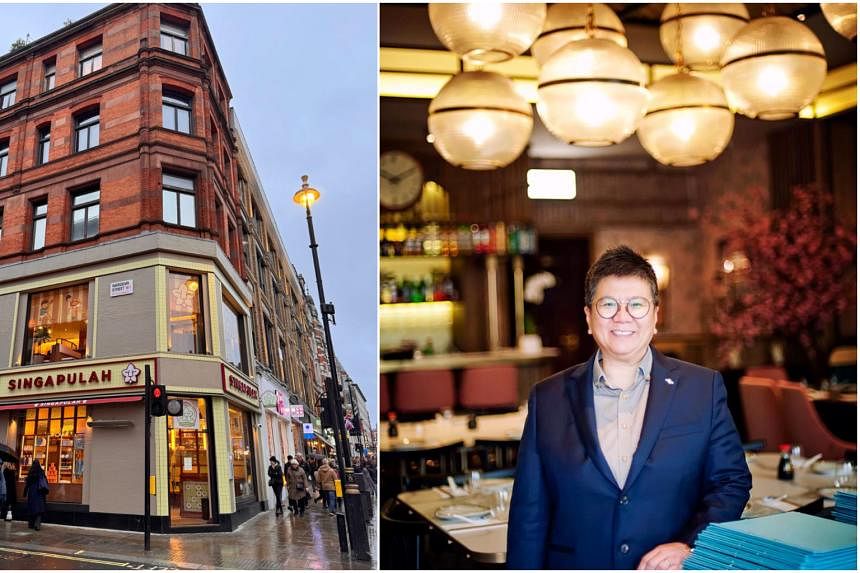SINGAPORE – A new restaurant in London sounds like a dream for any homesick Singaporean. On the menu are dishes such as laksa and bak chor mee. For dessert, there is colourful kueh lapis and kueh salat.
Even the drinks are Singaporean. Diners can order kopi-C, made with Robusta coffee beans. And the cocktails are made with spirits from two home-grown companies.
Indeed, Singapulah, a 100-seat restaurant that opens on Feb 15 in Shaftesbury Avenue in Soho, is a celebration of all things Singapore.
Will the British bite? Its Singaporean owner, Ms Ellen Chew, says yes.
Speaking to The Straits Times via Zoom, the 56-year-old says that when she opened her first restaurant, Rasa Sayang, in London in 2008, nobody knew what Singapore food was.
“The time is right now,” she adds. “Post-Covid-19, lots of small independent restaurants have opened and they are competing on authenticity. We have really authentic Vietnamese and African food here. I’m confident that people will love the food at Singapulah.”
Storytelling, she adds, is crucial. These stories include how Robusta coffee beans, often seen as inferior to Arabica beans, are roasted for a punchy cup of kopi; how the mushrooms for bak chor mee are stewed for hours; and how Singapore food is not just Chinese food.
The menu gives a primer on laksa, and there is a noodle cheat sheet with explainers for mee tai bak, mee kia, mee pok and others.
The proof is also in the tasting. Mr Jay Sim, 46, business development director for Chew On This, Ms Chew’s restaurant group, says that in “friends and family” meals in the lead up to opening, people have been intrigued by bak chor mee.
“Kopi pork ribs – they have never tasted anything like that,” he adds.
Singapulah also showcases home-grown brands. The menu includes information about all the brands the restaurant works with.
The restaurant has the support of a slew of government agencies – Enterprise Singapore (EnterpriseSG), Singapore Brand Office, Singapore Tourism Board and Singapore Global Network.
Ms Jeannie Lim, EnterpriseSG’s assistant chief executive officer (lifestyle & consumer), says Britain is a key market of interest for Singapore food manufacturers because it is receptive to global cuisines and there is a growing demand for Singapore food products.
More than 60 per cent of sales generated by Singapore food manufacturers come from overseas, she adds.
Britain is an attractive market also because its food and beverage industry generates a turnover of about US$310 billion (S$418 billion).

She adds: “Ultimately, the goal is to support the companies’ market entry plans and growth into Britain and the rest of Europe, and to share our well-loved Singapore food culture and brands with the world.”
EnterpriseSG decided to partner Chew On This on Singapulah, Ms Lim says, because the restaurant’s concept gives the Singapore brands exposure to Britons, tourists and other businesses. The brands have an opportunity to test products in a new market, and the restaurant group can help link the brands’ distributors with potential buyers.
Other food and lifestyle projects EnterpriseSG has supported include two in New York City.
The first is Makansutra founder K.F. Seetoh’s Urban Hawker foodcourt, which opened in 2022 and showcases Singapore hawker brands. There was also The Little Red Dot: Singapore Showcase, featuring 10 Singapore lifestyle brands such as footwear company Anothersole and premium skincare brand Porcelain. It ran from Oct 21, 2022, to Jan 22, 2023.
Singapulah is Ms Chew’s seventh restaurant. It cost a seven-figure sum to set up.
She went to London in 2005 with her partner, who had a job there. She intended to stay for five years and then return to Singapore, but has now been there 18 years. She had worked with a foodcourt operator in Singapore in leasing and marketing before heading to London.
Her first restaurant, which opened in London’s Chinatown in 2008, was Rasa Sayang, serving Malaysian and Singaporean food. She also has three Mrs Chew’s Chinese Kitchens in London, Birmingham and Stratford, serving halal Chinese dishes such as fried rice, roast duck and kung pao chicken. And in Heathrow Airport and Bicester Village outlet shopping centre in Oxfordshire, she has Shan Shui, serving halal Chinese and South-east Asian food.
Mr Sim says they met several of the companies that supply the restaurant at a trade fair in Singapore. They had been using ingredients available in Britain, but found a treasure trove of sauces, kueh and other products at the fair.

Many of the manufacturers they spoke to were keen to sell their wares overseas too.
Singapulah Bak Chor Mee (£16.95 or S$28.70) is made with noodles from Hiap Giap, chilli fish balls from DoDo and sambal chilli from Kwong Cheong Thye.
LG Foods supplies the mee tai bak used in the restaurant’s Singapore Laksa (£16.95). The pastry cups for Kueh Pie Tee (£10.95) come from Red Lips.
Dessert is also Singaporean. Udders is supplying ice cream in flavours such as Mao Shan Wang Durian (£6.50). Kueh manufacturer Lek Lim Nonya Kueh sends its Kueh Salat (£5.50) and Kueh Lapis (£5.50) to London.
For drinks, The Orientalist Spirits is supplying its vodka, gin, whisky and rum to make cocktails using Yeo’s drinks, and the beans for kopi come from Kim Guan Guan Coffee.
To make the restaurant an evolving showcase of Singapore brands, it will change its suppliers every six months. It will be up to Singaporean chef Andri Jamil, 48, to conjure up the taste of Singapore with the ingredients. He was a former partner and head chef of Est1819, a restaurant in Boat Quay.
There is also a retail space in Singapulah, where people can pick up some of the sauces and ingredients used in the dishes, and souvenirs and homeware from home-grown brands Singlapa and Supermama.
Singapulah’s design harks back to the Singapore of the 1970s. The restaurant is lit by chandeliers made from bowls and plates from home-grown tableware company Luzerne.
For some of the Singapore brands, Singapulah is an opportunity to showcase their wares to the world. Brands which already have a presence in Britain say the spotlight is more focused at the restaurant, since their products are listed in the dish descriptions on the menu. Potential distributors can also head to the restaurant to have a taste.
Mr Alvin Choo, 30, director of soya sauce brewer Kwong Cheong Thye, says his family’s soya sauce is used in London restaurants such as Hakkasan, Royal China and Imperial Treasure. He adds that Ms Chew’s restaurants have been using his sauces, getting them from his British distributors.
For Singapulah, she has also ordered the brand’s sambal chilli for the bak chor mee; and its coffee sauce for Kopi Pork Ribs (£15.95).
The tie-up with Singapulah, says the fifth-generation scion of the company, which was established in 1892, helps to showcase its products to the world.
“It’s not just the British, but also travellers visiting London, who will get to taste our products,” he says. “This will help us put Singapore brands on the world map.”

Mr Gavan Sing, 45, managing director of kueh manufacturer Lek Lim, is unleashing his frozen kueh salat, kueh lapis and crystal dumplings on the British capital. He is the third-generation owner of the business his grandfather started in 1968.
For five years, he worked on ways to freeze his kueh and dumplings so that they can be shipped overseas, brought back to life by boiling, and taste as good as freshly made versions.
He went through many iterations, tweaking the proportions of ingredients, until he found the right formula. Now, the brand’s ang ku kueh, Nonya kueh, soon kueh, crystal dumplings and yam cake can be frozen.
“It tastes exactly the same after you reheat it,” he says. “When we started, I wasn’t sure it would work.”
The kueh have been available at FairPrice supermarkets since November 2022, he says.
In 2023, he started shipping kueh to distributors in Melbourne who supply Asian grocery stores there. Perth restaurants will be able to get them from suppliers from March 2024. He is eyeing the Middle Eastern market next.
But first, London. Aside from the business potential, he has a personal reason for supplying Singapulah.
He says: “I was in the same position, in Melbourne 20 years ago, missing home and not finding anything from Singapore there. So let Singaporeans overseas have a taste of home, to remember what we ate as kids. They can share these memories with their colleagues.”
LG Foods is supplying Singapulah with its pasteurised kway teow, and another rice noodle not commonly found in London – mee tai bak.
Mr Kevin Lim, 35, head of strategy of the company, which started manufacturing noodles in 2005, says: “This is an opportunity to promote our food around the world and support our British distributor.”
The company’s noodles are available in Britain, the United States, the Middle East, Australia and Hong Kong.

Mr Michel Lu, 56, founder of The Orientalist Spirits, another brand working with Singapulah, says its wares are available in about 10 bars in Britain.
He says: “We work with very niche cocktail bars. Singapulah allows us to reach a broader audience. It’s a good place to showcase the spirits in cocktail form, and we want to see the response from locals and tourists. That’s super exciting.”
Three cocktails, priced at £12.95 each, pair his spirits with Yeo’s drinks. There is Dragon Highball made with its Dragon Whisky, Yeo’s lychee drink and coconut water from SiamCoco; Oriental Vesper made with Origins Vodka, Gunpowder Gin and Yeo’s chrysanthemum tea; and Grass Jelly Negroni, made with The Orientalist Imperial Solera Rum and Yeo’s grass jelly drink.
Diners can also order Compendium Spirits’ Chendol Gin, Rojak Gin, Kopi-O Liqueur, Teh-O Liqueur, and its Pineapple Tart, Bandung and Ondeh soju.
In short, the enterprise is Singapore, lah.
Ms Chew says: “We have to end the idea that Singapore food is Singapore Noodles. There is no such thing.”


